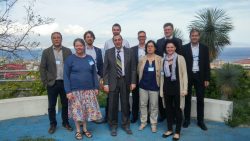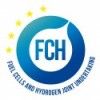About HPEM2GAS
Who
The HPEM2GAS consortium consists of 7 partners from 5 different EU countries:
- Consiglio Nazionale delle Ricerche (Coordinator, IT) – electrocatalysts preparation, definition of specification and protocols, life cycle analysis
- ITM Power (trading) limited (UK) – stacks and system manufacturer and integrator
- Solvay specialty polymers Italy S.p.A. (IT) – polymers and membranes preparation
- EWII Fuel Cell A/S (DK) – MEAs manufacture and testing
- Stadtwerke Emden GmbH (DE) –field testing, end-user
- Hochschule Emden/Leer (DE) – field test data analysis
- Uniresearch B.V. (NL) – project management support and dissemination

What
The HPEM2GAS is a Horizon 2020 / Fuel Cells and Hydrogen Joint Undertaking (FCH2 JU) funded project which focuses on the developments of a low costs PEM electrolyser for grid management and its related key technologies.
The full project title is: High Performance PEM Electrolyzer for Cost-effective Grid Balancing Applications.
The work performed so far already developed, among other aspects, new catalyst (CNR) and membranes (SLV) which have been tested and assembled in MEAs (EWII). Further an assessment of the state of the art PEM electrolyser has been performed (ITM) and the investigation of the plant in the field started (SWE and HS-EL). A report has been submitted (D2.1, public version available here on the project website) defining and describing a set of protocols for assessing and characterizing PEM electrolysis components. Related to dissemination activities (a public report D7.1 is available here), project website, flyer and project identity were addressed (UNR).
Why
The large-scale deployment of wind power and solar energy sources will strongly contribute to the implementation of Europe’s energy policies objectives, i.e. to produce 65% of electricity from renewable energy sources by 2050 and to reduce CO2 emissions linked to energy production by 50%. However, wind power and solar energy resources are characterised by intermittent behaviour and their fluctuations affect the stability and reliability of the electrical grid. Consequently, there is a strong need for rapid-response, cost effective and scalable energy storage systems capable of absorbing the electrical power exceeding the capacity of a transport and distribution line. This will considerably reduce the investments needed to build a new grid infrastructure. Hydrogen produced from water electrolysis can play a significant role as energy storage medium.
When
The project aims to conclude the 3 years of research with the development of competitive components and a reliable system, validated in a real environment by 6 months field testing, which could go into the market covering a wide range of hydrogen capacity.
The field test comprises:
- Performing start-up/shut-down and load cycles tests under various conditions to determine the system’s control capability and the performance and dynamic behaviour of the system
- Demonstration of the technology by executing a >6 months field test at Emden (Germany) by interfacing the electrolyser to the SWE water, gas and electricity grids.
Where
The field testing for the HPEM2GAS project will be done in the city of Emden, Germany.
Emden is a town and seaport in Lower Saxony in the northwest of Germany, on the river Ems. It is the main town of the region of East Frisia and has a total population of just over 50,000. Stadtwerke Emden (SWE) is the local supplier for electricity water and gas. Two wind farms have been built in the city of Emden which provides 117% (240 MWh/y) of the electric energy for homes. Furthermore, photovoltaic panels have been installed on a noise barrier along the motorway, on an old bunker and on a gymnasium. Emden also has a geothermal installation. Emden’s ambition is to use 100% renewable energy (electricity and gas) by 2030.
Operation of a PEM electrolyser in Emden supports the grid by improving power quality and assists in power balancing and energy management. It will essentially contribute to smooth production/consumption in the local grid of the Emden.
How
The HPEM2GAS project will develop a low cost PEM electrolyser optimised for grid management through both stack and balance of plant innovations, culminating in a six month field test of an advanced 180 (nominal) kW PEM electrolyser.



